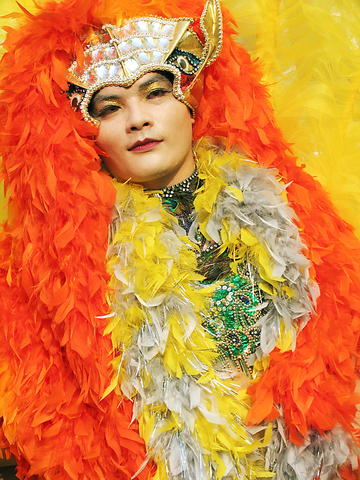Taiwan's lesbian, gay, bisexual and transgender (LGBT) community will set off on its annual parade tomorrow in an effort to promote equality, fight discrimination and have some fun.
Taiwan Pride 2005, organized by the Tongzhi Hotline Association (台灣同志諮詢熱線), will begin outside the Eslite bookstore at 1pm at the corner of Renai and Dunhua South roads and progress down Zhongxiao East Road, ending at the Taipei City Government offices at around 4:30pm.
Taiwan Pride activities this year include a costume competition for which contestants are required to register in advance, speeches, a celebrity guest speaker and a performance by local band La Zi (拉子). Members of Amnesty International Hong Kong's LGBT group will also join the parade to show solidarity.

PHOTOS: JULES QUARTLY, TAIPEI TIMES
There have been gay carnivals since 1999, but the first Pride parade, held in 2003, was organized as part of a government-sponsored festival. But last year Taiwan Pride organizers organized and funded the event themselves, citing limits placed on parade activities and a lack of political will to push through legislation that would make Taiwan the first Asian nation to allow gay marriage.
"We want to let the government know we demand our civil rights and that these must be written into law," said Ashley Wu (巫緒樑), the director of public affairs at the Taiwan Tongzhi Hotline Association.
The hotline, which operates under the name tongzhi, meaning comrade, provides services such as counseling for the LGBT community and receives some 800 calls a year seeking help on a wide range of issues.

Breaking from official support has freed the parade organizers to form alliances with other activist groups including the Association for Ri Ri Chun (日日春關懷互助協會) that advocates the rights of workers in the sex industry and BDSM which supports practitioners of sadomasochism and bondage.
The linkage has raised some eyebrows, but Wu argues these groups represent citizens that fall outside socially accepted norms of sexual behavior.
"We are in the same boat because society discriminates against tongzhi, sex workers and members of BDSM," Wu said.
Taiwan is generally seen as a relatively open society with violence linked to sexual orientation a rarity. But Josephine Chuen-juei Ho (何春蕤), professor at the Center for the Study of Sexualities, National Central University, said the relative lack of violence does not equate with acceptance or tolerance.
"The traditional Chinese culture of reticence, where most discrimination is done under the table, prevents open confrontation that would warrant a protest ... so that sort of limits what gay movements can fight," Ho said.
"They can only fight for certain issues that have become policy. But with the general homophobic atmosphere there's no place where you can put your fingers on and say you know there's something wrong here, we need to change this."
A prominent battle that has become a focal point for this years' Taiwan Pride march is the recent court case of Gin Gin bookstore owner J.J. Lai (賴正哲), who was convicted of selling indecent gay magazines. The case, which received widespread attention, is currently pending an appeal hearing at the Taiwan High Court.
For Wu and many other LGBT citizens, the case appears to be an obvious example of discrimination against the gay community.
Activists' arguments against the prosecution of Lai revolve around the perceived violation of civil rights.
"The importation of Western multiculturalism means that people tend to think that when multiculturalism is stronger there will be more room for gay activism, gay ideas, gay values, gay rights," Ho said. "But, on the other hand it also makes alternative views, gay-unfriendly views, become more pronounced."
For more information visit http://twpride.net/ or call (02) 2392 1969.

June 23 to June 29 After capturing the walled city of Hsinchu on June 22, 1895, the Japanese hoped to quickly push south and seize control of Taiwan’s entire west coast — but their advance was stalled for more than a month. Not only did local Hakka fighters continue to cause them headaches, resistance forces even attempted to retake the city three times. “We had planned to occupy Anping (Tainan) and Takao (Kaohsiung) as soon as possible, but ever since we took Hsinchu, nearby bandits proclaiming to be ‘righteous people’ (義民) have been destroying train tracks and electrical cables, and gathering in villages

Dr. Y. Tony Yang, Associate Dean of Health Policy and Population Science at George Washington University, argued last week in a piece for the Taipei Times about former president Ma Ying-jeou (馬英九) leading a student delegation to the People’s Republic of China (PRC) that, “The real question is not whether Ma’s visit helps or hurts Taiwan — it is why Taiwan lacks a sophisticated, multi-track approach to one of the most complex geopolitical relationships in the world” (“Ma’s Visit, DPP’s Blind Spot,” June 18, page 8). Yang contends that the Democratic Progressive Party (DPP) has a blind spot: “By treating any

Swooping low over the banks of a Nile River tributary, an aid flight run by retired American military officers released a stream of food-stuffed sacks over a town emptied by fighting in South Sudan, a country wracked by conflict. Last week’s air drop was the latest in a controversial development — private contracting firms led by former US intelligence officers and military veterans delivering aid to some of the world’s deadliest conflict zones, in operations organized with governments that are combatants in the conflicts. The moves are roiling the global aid community, which warns of a more militarized, politicized and profit-seeking trend

This year will go down in the history books. Taiwan faces enormous turmoil and uncertainty in the coming months. Which political parties are in a good position to handle big changes? All of the main parties are beset with challenges. Taking stock, this column examined the Taiwan People’s Party (TPP) (“Huang Kuo-chang’s choking the life out of the TPP,” May 28, page 12), the Democratic Progressive Party (DPP) (“Challenges amid choppy waters for the DPP,” June 14, page 12) and the Chinese Nationalist Party (KMT) (“KMT struggles to seize opportunities as ‘interesting times’ loom,” June 20, page 11). Times like these can